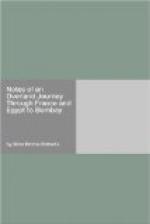The absolute necessity of paying one of these men, in order to secure the forbearance of his colleagues, is illustrated by an anecdote commonly told. It appears that two friends were living together, one of whom had engaged a Ramoosee, while the other, not imagining it to be incumbent upon him to incur the same expense, neglected this precaution. One night, every thing belonging to this unfortunate chum was stolen. The Ramoosee was summoned, and accused of not having performed his duty. He boldly denied the charge. “All master’s property is safe,” he said; “when master lose any thing, I will account for it.”
The fidelity with which the greater number of natives, however corrupt in other respects, fulfil all their engagements, the few instances in which a pledge once given is forfeited, if taken into grave consideration, would do much towards settling the point at issue between the Bishop of London and Sir Charles Forbes. The word of a native, generally speaking, if solemnly given, is a bond never to be broken, while an oath is certainly not equally binding.
In accusing the natives of a deliberate crime in the commission of perjury, we do not sufficiently reflect upon the difference of the religious principles which actuate Christians, and the heinous nature in their eyes of the sin of calling upon a God of purity to witness their falsehoods. If we could administer an oath to a native, the profanation of which would fill him with equal horror, we should find that he would speak the truth. A case in point occurred lately at Aden. There are a class of Mohammedans who are great knaves, many being addicted to cheating and theft: the evidence of these men cannot be depended upon, since for the value of the most trifling sum they would swear to any thing. Nevertheless, although they do not hesitate to call upon God and the Prophet to witness the most flagrant untruths, they will not support a falsehood if put to a certain test. When required to swear by a favourite wife, they refuse to perjure themselves by a pledge which they esteem sacred, and will either shrink altogether from the ordeal or state the real fact.
The following occurrence is vouched for by an eye-witness: “A Somali had a dispute with a Banian as to the number of komasies he had paid for a certain article, swearing by God and the Prophet that he had paid the price demanded of him for the article in question; but no sooner was he called upon to substantiate his assertions by swearing by his favourite wife, than he threw down the article contended for, and took to his heels with all speed, in order to avoid the much dreaded oath.” It will appear, therefore, that there is scarcely any class of persons in India so utterly destitute of principle, as to be incapable of understanding the obligation of an oath, or the necessity of speaking truth when solemnly pledged to do so, the difficulty being to discover the asseveration which they consider binding.




